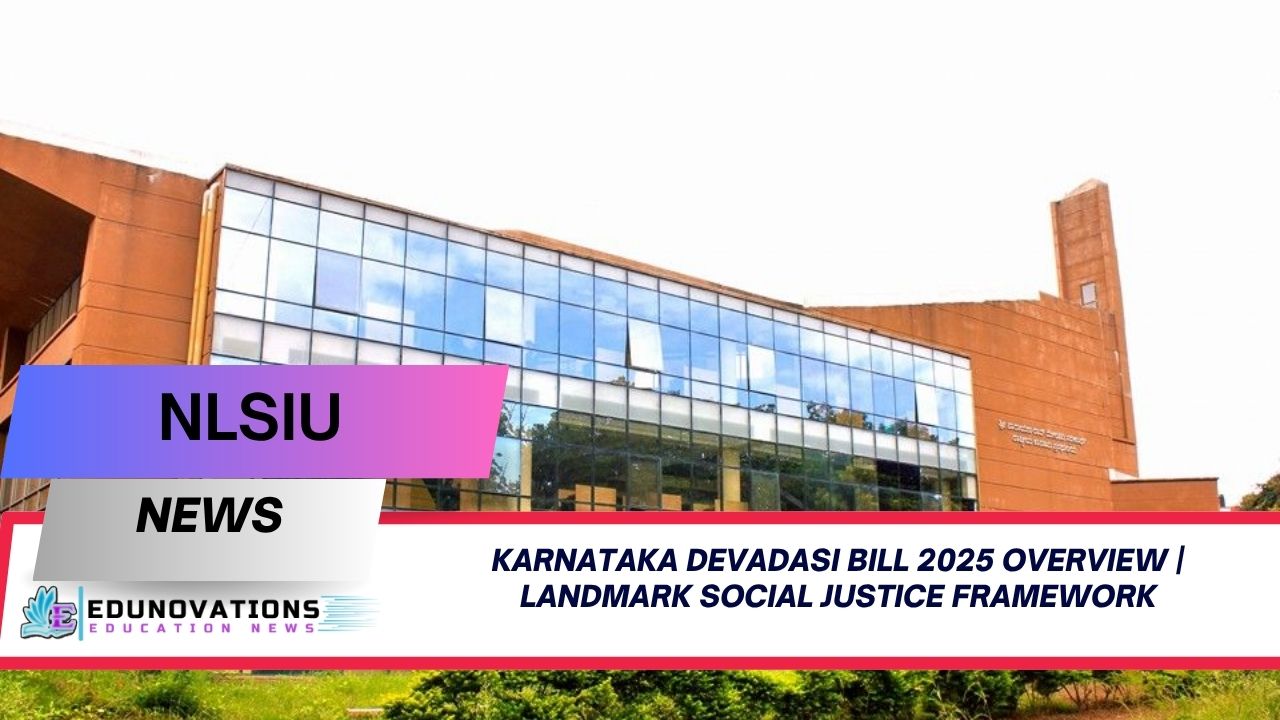Explore the Karnataka Devadasi Bill 2025 overview, its social inclusion impact, and rights of Devadasi children under this groundbreaking legislation.
The Karnataka Devadasi Bill 2025 overview marks a pivotal moment in India’s legislative journey toward eradicating the centuries-old Devadasi system. Championed by the Centre for the Study of Social Inclusion at the National Law School of India University (NLSIU), this bill not only prohibits the exploitative Devadasi practice but also paves the way for comprehensive relief and rehabilitation of affected individuals.
The bill’s introduction signals a robust commitment to social justice, focusing on empowering vulnerable communities and integrating human rights with progressive policy measures. This article delves into the key aspects of the Karnataka Devadasi Bill 2025, emphasizing its significance, legal provisions, and anticipated social impact.
Understanding the Devadasi System and Its Abolition
The Devadasi tradition, historically rooted in ritual dedication of young girls to temples, has unfortunately morphed over time into a practice often linked with exploitation and human rights violations. The Devadasi system abolition Karnataka 2025 aims to formally eradicate this exploitative custom through stringent legal measures.
While previous laws targeted the practice, the 2025 bill stands out due to its inclusive approach, incorporating relief provisions for survivors and their children, along with stringent penalties for offenders. It also addresses socio-economic rehabilitation, ensuring that survivors can reclaim dignity and opportunities.
Key Provisions of the Karnataka Devadasi Bill 2025
Prohibition and Prevention Measures
The bill clearly criminalizes the dedication of girls as Devadasis and prohibits any form of exploitation related to this practice. It mandates awareness campaigns and social monitoring mechanisms to prevent recurrence, thereby fostering community-level vigilance.
Toppers Use Mind Maps to score more than 95%
NCERT Class 11th Commerce Mind Maps
Add to cartOriginal price was: ₹999.00.₹199.00Current price is: ₹199.00.NCERT Class 12th Chemistry Mind Maps
Add to cartOriginal price was: ₹199.00.₹75.00Current price is: ₹75.00.NCERT Class 12th Commerce Mind Maps
Add to cartOriginal price was: ₹999.00.₹199.00Current price is: ₹199.00.NCERT Class 12th Science Mind Maps
Add to cartOriginal price was: ₹999.00.₹199.00Current price is: ₹199.00.NCERT Mind Maps For Class 10th
Add to cartOriginal price was: ₹999.00.₹199.00Current price is: ₹199.00.
Purchase Today
Rights of Devadasi Children Karnataka Law
One of the most progressive aspects of this legislation is the explicit recognition of the rights of Devadasi children Karnataka law. It guarantees these children access to education, healthcare, and social welfare schemes, aiming to break the cycle of marginalization often perpetuated by the Devadasi system.
Relief and Rehabilitation Initiatives
Survivors are entitled to financial assistance, skill development programs, and counseling services. This holistic approach aims to reintegrate survivors into mainstream society, thus transforming lives and communities.
NLSIU Devadasi Bill Research Findings and Contributions
The bill’s formulation was backed by rigorous academic research conducted by the Centre for the Study of Social Inclusion at NLSIU. The NLSIU Devadasi Bill research findings highlight the socio-economic challenges faced by Devadasis and underscore the necessity for a multidimensional legal framework that goes beyond criminalization.
Experts at NLSIU emphasize that addressing the root causes — poverty, lack of education, and social stigma — is critical for the bill’s success. Their research advocates for collaborative efforts involving government agencies, civil society, and grassroots organizations.
Social Inclusion Impact of the Karnataka Devadasi Bill
The Karnataka Devadasi Bill social inclusion impact is profound. By embedding social justice principles into legislation, the bill not only dismantles a harmful tradition but also promotes inclusive development. This aligns with broader national goals of empowering marginalized communities and ensuring equal rights.
Social inclusion here extends beyond legal protection to encompass economic empowerment, gender equality, and educational access — key drivers in transforming the lives of affected women and children.
Expert Insights on the Bill’s Significance
Legal scholar Prof. Anjali Menon of NLSIU remarked, “This bill is a critical step forward in protecting the rights and dignity of women historically subjected to systemic exploitation. Its comprehensive provisions set a precedent for other states grappling with similar issues.”
Human rights activist and author Dr. Rajesh Iyer adds, “The success of the Karnataka Devadasi Bill 2025 lies in its emphasis on rehabilitation. Merely criminalizing the practice is not enough; the state must provide survivors with pathways to a dignified life.”
Broader Implications and Next Steps
The Karnataka government’s adoption of this bill is expected to inspire legislative reforms in other Indian states where the Devadasi system persists. The bill’s framework could serve as a model for creating inclusive laws that prioritize both prevention and survivor welfare.
For students and researchers keen on social justice and legal reforms, the Karnataka Devadasi Bill 2025 presents an invaluable case study. Resources like NCERT Courses and current legal analysis available at Current Affairs can provide further insights into this landmark legislation.
Summary of the Bill’s Impact:
- Eradicates exploitative Devadasi practice through stringent laws.
- Protects rights of Devadasi children, ensuring access to education and welfare.
- Focuses on survivor rehabilitation via financial and social support.
- Promotes social inclusion aligned with national equality goals.
- Backed by NLSIU research, emphasizing multi-sector collaboration.
Enhancing Awareness and Engagement
To sustain momentum, awareness programs and educational campaigns are vital. Interested readers can explore comprehensive notes on related social justice issues at Notes and engage with relevant MCQs for self-assessment via MCQ’s. Visual learners can benefit from detailed explainer videos available at Videos.
Additionally, the bill’s impact can be studied in connection with broader syllabus frameworks on human rights and law through resources at Syllabus.
Conclusion
The Karnataka Devadasi Bill 2025 overview highlights a transformative legal framework aimed at eradicating a centuries-old exploitative system while embedding social justice and inclusion at its core. Through robust legal measures, survivor-centered rehabilitation, and community engagement, the bill sets a new standard for addressing deep-rooted social issues.
This landmark legislation reflects India’s commitment to upholding human dignity and rights, providing hope for generations to come.
Frequently Asked Questions (FAQs)
- What is the Karnataka Devadasi Bill 2025 overview?
The bill is a comprehensive legal framework aimed at preventing the Devadasi system and promoting rehabilitation. - How does the Devadasi system abolition Karnataka 2025 law work?
It criminalizes the practice, sets penalties, and provides support for survivors. - What rights do Devadasi children have under Karnataka law?
They are entitled to education, healthcare, and social welfare programs. - What are the key findings from NLSIU Devadasi Bill research?
The research stresses the need for multi-sectoral collaboration and survivor rehabilitation. - How will the Karnataka Devadasi Bill social inclusion impact communities?
By promoting equality, economic empowerment, and social integration. - Who contributed to drafting the Karnataka Devadasi Bill 2025?
The Centre for the Study of Social Inclusion at NLSIU played a pivotal role. - What rehabilitation measures are included in the bill?
Financial aid, skill training, and counseling services. - How can one learn more about related social justice topics?
Through NCERT Courses and Current Affairs. - Does the bill address prevention strategies for the Devadasi system?
Yes, it mandates awareness campaigns and community monitoring. - Where can I find authoritative resources on Karnataka laws?
Reputable educational platforms and government publications are recommended.














